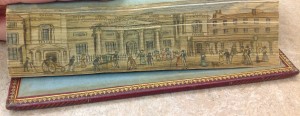
Fore-edge book art is a style of art that was popularized in the late eighteenth-century. A fore-edge painting is defined as, “a painting broken up into many separate parts, each of which appears on the right-hand (fore-edge) margin of each recto page of a book. The whole painting only becomes visible when the pages are fanned out.” After a fore-edge painting was completed, the pages were often gilt– further disguising the hidden works of art. These paintings were usually added after the purchase of the book as a way to make it more special and personal for the recipient. As such, the content of the painting sometimes had little to do with the content of the book, but was selected with the recipient in mind. These paintings can often be found on books of devotionals and poems, but also on books covering a wide range of other subjects.
The Mudd Library has a lovely and varied collection of books with fore-edge art that were donated by two alumnae, Dorothy Ross Pain Lawrence class of 1918, and Bernice Davis Fligman Milwaukee-Downer class of 1922. To share the beauty and experience of seeing one of these paintings revealed, we’ve taken advantage of the short, looping video format of Vine. A beautiful image of a horse in a barn is revealed in the book, A General History of Quadrupeds. Stanfield’s Coast Scenery, reveals sailboats on the Channel, and The Etonian, displays Windsor Castle. The Book of Common Prayer, a prayer book from 1826 for the United Church of England and Ireland hides an image of Glamis Castle.
The Mudd Library special collections contain many interesting and lovely books with interesting and lovely histories. We plan on continuing to share these stories as often as possible.
Special terms defined:
Gilt: a shiny material, usually gold, used as a thin covering to other material, with gold leaf decoration, gilt in the rounda foredge which is gilded after the book has been rounded, gilt in the square a foredge which is gilded before the book has been rounded
Recto: The ‘right’ or more important side of a two-sided object, e.g. a sheet of paper. In a book, the right-hand page (the left being the verso).
Sources:
“fore-edge, foredge, painting.” The Thames & Hudson Dictionary of Art Terms. London: Thames & Hudson, 2003. Credo Reference. Web. 06 December 2013.
“gilt.” Dictionary of Publishing and Printing. London: A&C Black, 2006. Credo Reference. Web. 12 December 2013.
Matthews, Jack. Collecting Rare Books: For Pleasure and Profit. G.P. Putnam’s Sons, New York, 1977.
“recto.” The Thames & Hudson Dictionary of Art Terms. London: Thames & Hudson, 2003. Credo Reference. Web. 06 December 2013.
Recent Comments